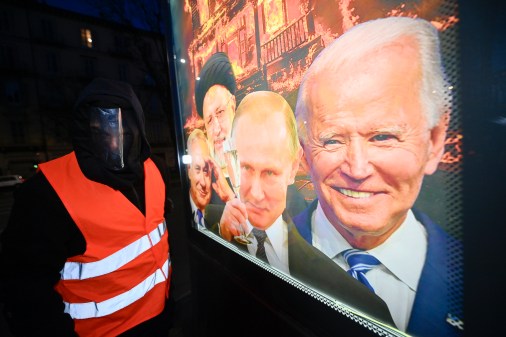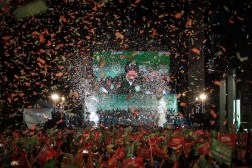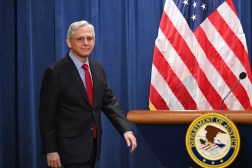Russia, Iran ran influence operations aimed at 2020 elections, US says

The governments of Russia and Iran sought to influence the U.S. presidential elections in 2020 and exacerbate societal tensions throughout the nation last year, the U.S. intelligence community said in a declassified assessment released Tuesday.
The long awaited report from the Office of the Director of National Intelligence detailing how foreign governments sought to influence or interfere in U.S. elections declared that Russian President Vladimir Putin authorized the influence operations that were aimed at denigrating Joe Biden’s candidacy and the Democratic Party while supporting then-President Donald Trump. The assessment states that Supreme Leader Ali Khamenei “probably” authorized Iran’s campaign, which was aimed at undermining Trump’s reelection.
Both Russia and Iran intended to undermine public confidence in the electoral process as well, the report states.
China did not run influence operations aimed at the U.S. elections, but Chinese authorities had considered doing so, the U.S. intelligence community found.
The assessment, which was drafted by the CIA, FBI, National Security Agency, Department of Homeland Security and the State Department’s Bureau of Intelligence and Research, is based on intelligence received as of December 31, 2020, according to the document. The Treasury Department also coordinated on the assessment.
The intelligence community has found no indications that foreign actors attempted to “alter any technical aspect of the voting process” in the 2020 elections, according to the assessment.
The news that Russia and Iran sought to influence the election is not entirely a surprise. Federal agencies have previously pegged influence operations targeting the U.S. elections last year on Iran and Russia, such as an email campaign linked with Iran that threatened voters to vote for Trump in October last year, an operation the intelligence community assessment explains in detail. The Iranian influence campaign also leveraged Facebook, such as which an Iranian network of fake accounts spread misinformation about the threats.
Some Russian efforts to influence the 2020 elections have also already been exposed publicly, such as the Russian government’s troll farm effort to recruit journalists to write on political topics, including Biden, for a fake political organization.
The FBI had tipped Facebook off to both of those threats, as CyberScoop reported.
The Treasury Department also moved to sanction four Russia’-linked individuals for their efforts to interfere in the 2020 elections last September.
The intelligence community added that it has assessed that Putin “had purview over” the activities of Andriy Derkach, a Ukrainian man who the Treasury Department assessed last fall had waged a covert influence operation meant to sway public opinion in the U.S. in advance of the 2020 presidential elections. Derkach was assessed at the time to be an “active Russian agent for over a decade.”
Konstantin Kilimnik, a Ukrainian political operative who former Special Counsel Robert Mueller had previously said has “ties” to Russian intelligence, “took steps throughout the election cycle to damage US ties to Ukraine, denigrate President Biden and his candidacy, and benefit former President Trump’s prospects for reelection,” the ODNI report published Tuesday says.
The intelligence community’s assessment details Derkach’s and Kilimnik’s activities as evidence of Russia’s conduits and methods for influencing the U.S. election.
“A key element of Moscow’s strategy this election cycle was its use of proxies linked to Russian intelligence to push influence narratives-including misleading or unsubstantiated allegations against President Biden,” the U.S. intelligence community report states.
The intelligence community’s assessment that China did not run influence operations runs counter to Trump’s previous unfounded claims that China wanted him to lose reelection.
In fact, “China sought stability in its relationship with the United States, did not view either election outcome as being advantageous enough for China to risk getting caught meddling, and assessed its traditional influence tools- primarily targeted economic measures and lobbying-would be sufficient to meet its goal of shaping US China policy regardless of the winner,” according to the intelligence community report.
Much of China’s messaging online was geared towards “bolstering China’s global position rather than to affect the 2020 US election,” the assessment states.
U.S. intelligence also found that other foreign actors, including Lebanese Hizballah, Cuba and Venezuela, made attempts to influence the 2020 U.S. elections, though at a smaller scale. Hizballah Secretary General Hassan Nasrallah “supported” efforts to undermine Trump, while Cuba sought to amplify anti-Republican and pro-Democrat narratives to the Latin American community, the assessment says. Venezuela probably had the intent but lacked the capability to run influence operations targeting the 2020 elections, the assessment says.
CyberScoop previously reported that the list of foreign governments working to meddle in the 2020 elections included Cuba, North Korea and Saudi Arabia.




